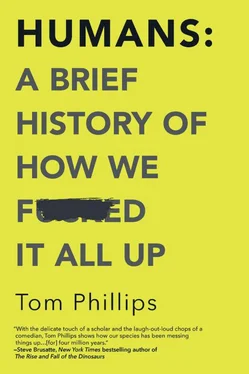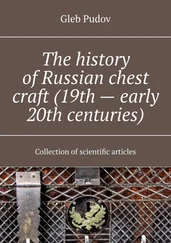Tom Phillips - Humans - A Brief History of How We F*cked It All Up
Здесь есть возможность читать онлайн «Tom Phillips - Humans - A Brief History of How We F*cked It All Up» весь текст электронной книги совершенно бесплатно (целиком полную версию без сокращений). В некоторых случаях можно слушать аудио, скачать через торрент в формате fb2 и присутствует краткое содержание. Город: Toronto, Год выпуска: 2019, ISBN: 2019, Издательство: Hanover Square Press, Жанр: История, Юмористические книги, на английском языке. Описание произведения, (предисловие) а так же отзывы посетителей доступны на портале библиотеки ЛибКат.
- Название:Humans: A Brief History of How We F*cked It All Up
- Автор:
- Издательство:Hanover Square Press
- Жанр:
- Год:2019
- Город:Toronto
- ISBN:978-1-48805-113-5
- Рейтинг книги:4 / 5. Голосов: 1
-
Избранное:Добавить в избранное
- Отзывы:
-
Ваша оценка:
- 80
- 1
- 2
- 3
- 4
- 5
Humans: A Brief History of How We F*cked It All Up: краткое содержание, описание и аннотация
Предлагаем к чтению аннотацию, описание, краткое содержание или предисловие (зависит от того, что написал сам автор книги «Humans: A Brief History of How We F*cked It All Up»). Если вы не нашли необходимую информацию о книге — напишите в комментариях, мы постараемся отыскать её.
Humans: A Brief History of How We F*cked It All Up — читать онлайн бесплатно полную книгу (весь текст) целиком
Ниже представлен текст книги, разбитый по страницам. Система сохранения места последней прочитанной страницы, позволяет с удобством читать онлайн бесплатно книгу «Humans: A Brief History of How We F*cked It All Up», без необходимости каждый раз заново искать на чём Вы остановились. Поставьте закладку, и сможете в любой момент перейти на страницу, на которой закончили чтение.
Интервал:
Закладка:
It’s also not clear quite how Paterson so consistently persuaded his fellow directors of the Company of Scotland to back his vision of Darien as the hub of Scotland’s global empire, based on little more than hearsay. Certainly they had plenty of opportunities to change course—in 1697, a year before the fleet set sail, they actually came close to abandoning the Darien scheme entirely and focusing instead on more modest goals.
They were becoming aware that the Company, flush with cash after its fundraising in Edinburgh, had now wildly overspent and could not guarantee funds to fully support the scheme’s ambitions. (They’d foolishly decided to purchase entirely new state-of-the-art ships on the continent, at a time when most of their rivals rented the majority of their fleet. Possibly this was an effort to big themselves up to potential Dutch and Germanic investors—kind of like a tech start-up with no revenue but swanky offices in the most expensive part of town.) The directors had multiple experts of good standing casting doubt on the viability of the expedition, urging instead that the capital raised be spent on less imperial trade missions to Asia. They were fully aware of all the pitfalls of Darien as a destination, and even considered several other locations in the Americas that might have been better suited… yet still this group of sober, well-educated and terribly respectable individuals convinced themselves that they’d been right all along, and decided to forge ahead.
Exactly what those pitfalls were started to become clear shortly after the colonists arrived, at the beginning of November 1698. Many of them hadn’t even been aware that Darien was their destination: their orders were only revealed once the ships had sailed, as part of the Company’s hopeless efforts to keep their plans secret from rivals.
To begin with, things seemed pretty great. The settlers were awestruck by the location’s natural beauty and the (to them) alien species—the land turtles and sloths and giant anteaters. The local Guna people seemed friendly, and spoke of gold mines just a few miles away. The settlers were delighted to discover a “most excellent harbor,” a naturally sheltered two-mile-long bay that one of them, Hugh Rose, believed was “capable of containing 1,000 of the best ships in the world.” Another anonymous diarist wrote that “the Soil is rich, the Air is good and temperate, and everything contributes to make it healthful and convenient.”
“Healthful” may have been an overstatement. Before long, some of the colonists began to get sick and die. William Paterson’s wife was one of the first to pass, less than two weeks after they landed. A few days after that, the colony’s last religious minister perished, as well.
But despite these tragedies, the settlers remained confident. They named the bay Caledonia, after the old name of Scotland, and immediately set about constructing their first town, which they called New Edinburgh. So delighted were they with their finds that they dispatched the expedition’s chief accountant, Alexander Hamilton (not the one from the musical), to make the return journey on a passing French pirate ship and deliver the glad tidings to home.
A fairly clear sign of how badly wrong things were actually going came when Hamilton’s ship sank as soon as it left the harbor.
At this point, it became apparent exactly why such a large natural harbor was going unused by any other colonial power. Rather like the Hotel California, getting into it was a doddle, but leaving was quite another matter. The prevailing winds blew in such a way that upon exiting the shelter of the bay, ships were immediately forced backward and assailed by huge waves. The ship carrying Hamilton was smashed to pieces in around thirty minutes, drowning almost half the crew. (Hamilton himself survived, and would eventually make it back to Scotland to tell everybody how well the expedition was going.) The Company had been warned by experienced sailors that their large, expensive ships with shallow keels were entirely unsuited to the conditions of the Caribbean, but they’d ignored that advice. For a proposed trading colony, you’d think the fact that their ships were going to be stuck in the harbor for many months of the year might have prompted second thoughts, but no.
It’s also questionable how clearly they’d thought the whole trade thing through. For a trade mission, Douglas Watt’s research suggests they’d spent a remarkably small amount of their budget on tradable goods—which mostly consisted of major stores of cloth, but also included over 200 periwigs, a sizable stock of fashionable shoes and a large number of combs. (The last were possibly brought along in the belief that native peoples around the world universally lose their shit at the sight of a comb, and will promptly trade away their land. In the end, the Guna seem to have given not the slightest toss about combs.) On the other hand, if the mission’s goal was simply to establish a settlement, they could maybe have done with slightly fewer wigs and a couple more tools instead.
As the task of building New Edinburgh began, morale quickly began to plummet. The work was backbreaking, and taking place in entirely un-Scottish heat. When, after two months of fruitless hacking away at thick jungle that never seemed to yield, the project leaders decided they’d been building in the wrong place all along (“a mere Morass,” as Paterson described it), spirits sank even lower. Then the rains began—and the rain in Panama is not like the rain in Scotland. The diarist Rose also changed his positive opinion of the location rather quickly, now writing: “On the main and all the bay round full of mangrow and swampy ground, which is very unwholesome.”
The swamps were more than unwholesome. The sickness that had already killed Paterson’s wife started to take the colonists in ever larger numbers. It’s not clear what it was, as they merely recorded it as “the fever,” but the best bet is malaria or yellow fever thanks to mosquitoes in those nearby swamps. (Both diseases, of course, were themselves colonists, having been helpfully brought over from the Old World by Europeans.) The settlers were dying at an alarming rate.
Those who didn’t get sick from the fever were increasingly destroying their health in other ways, thanks to the fact that one major perk of the trip the Company of Scotland had decided on was a plentiful supply of liquor. The people of Caledonia started to drown their sorrows in rum and brandy, which did not make the work of building New Edinburgh go any quicker. After a while, the leaders decided to abandon construction of the town entirely and focus on the creation of a fort, as they grew increasingly wary of a large-scale Spanish attack.
Ah yes. The Spanish. You see, we haven’t actually mentioned the biggest, most startlingly obvious problem with Paterson’s scheme yet: the fact that the Spanish were pretty bloody sure they already owned Darien.
They got this notion from a few little things. Like them having been active on the Panamanian isthmus for almost two centuries. Like how it was a vital route for them to ship their plundered South American gold and silver back to Spain. And like the way that Darien lay right between three of their major cities. They had actually occupied Darien in the past, before abandoning it due to all the problems the Scots were just now discovering. The idea that Spain was about to let an upstart country simply waltz in and establish a new colony slap bang in the middle of their own was laughable.
How did the Company of Scotland ever think the Spaniards would let them get away with this? It’s a true head-scratcher. But here we do at least have a general idea of their thinking. Buoyed by romantic pirate tales of successful attacks on Spanish properties in the area, they seem to have believed that Spain had become a paper tiger, a fading imperial power with its best days long behind it. Despite the fact that Spain’s navy outnumbered Scotland’s (by one navy to zero), they likely believed that if they could repel any initial attacks, they’d be able to successfully call their opponent’s bluff.
Читать дальшеИнтервал:
Закладка:
Похожие книги на «Humans: A Brief History of How We F*cked It All Up»
Представляем Вашему вниманию похожие книги на «Humans: A Brief History of How We F*cked It All Up» списком для выбора. Мы отобрали схожую по названию и смыслу литературу в надежде предоставить читателям больше вариантов отыскать новые, интересные, ещё непрочитанные произведения.
Обсуждение, отзывы о книге «Humans: A Brief History of How We F*cked It All Up» и просто собственные мнения читателей. Оставьте ваши комментарии, напишите, что Вы думаете о произведении, его смысле или главных героях. Укажите что конкретно понравилось, а что нет, и почему Вы так считаете.












